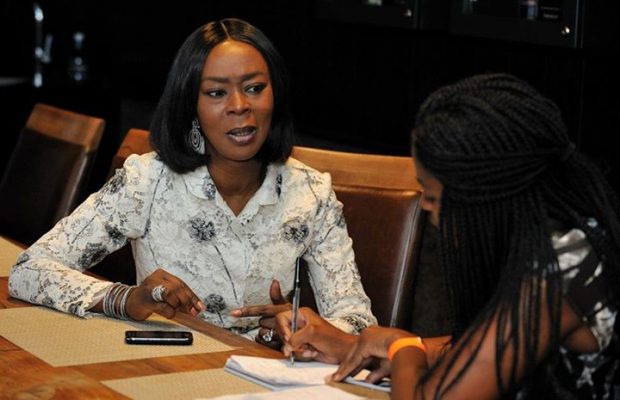The Midwifery Services We Need To Deliver Family Planning — Toyin Saraki

The 4th Nigeria Family Planning Conference in Abuja this week hosted the Africa regional launch of The Lancet Maternal Health Series. National and international health leaders were on hand for this important gathering, including the Honourable Minister of Health Isaac Folorunso Adewole and Wellbeing Foundation Africa’s Founder, Her Excellency Toyin Saraki, Global Goodwill Ambassador to the International Confederation Of Midwives, UNFPA Nigeria Family Planning Champion and wife of Nigeria’s Senate President, and Professor Oona Campbell, author of the 2016 Lancet Maternal Health Series.
Mrs. Saraki, a co-author of the previous 2015 Lancet Maternal Health Series: Stillbirths: Economic And Psychosocial Consequences – and having attended the initial launch of the 2016 Series report at the global stage to coincide with the 71st UN General Assembly in September, observed that The Lancet Maternal Health Series covers the epidemiology of maternal health, the current landscape of maternal health care and services in both high- and low-income countries, and lays out future challenges and strategies to improve maternal well-being.
Speaking at Nigeria’s 4th Family Planning Conference in her capacity as UNFPA Nigeria Family Planning Champion, Mrs Saraki addressed stakeholders alongside fellow panelists Professor Oona Campbell who launched the Series, Professor Adinma, Dr Kole Shettima, Dr Tunde Segun and Dr Allisyn Moran with the discussion entitled: “What is family planning doing for maternal health in Nigeria” – Mrs. Saraki noted:
“I welcome the Nigeria launch of the 2016 series which provides all stakeholders and policy-makers the evidence with which to guide concrete actions to improve maternal newborn child and adolescent health services”
“The launch of this report, coinciding with the revised WHO guidelines which recommend that pregnant women in low and middle income regions receive 8 antenatal visits, and increased recommendation from the 4 antenatal visits previously indicated within the WHO’s focused Antenatal Care policy, vindicates the Well-being Foundation Africa’s MamaCare Antenatal And Postnatal Skills And Drills Curriculum model for midwives and mothers respectively demonstrating that the provision of a midwifery-led continuum of care and counsel, along with universal access to high quality affordable health services through community health insurance, improved training in emergency obstetric and newborn care, underpinned by integrating its robust patient-custody health records with digital facility health records and civil registrations data skill-sets are, together. crucial to improving survival and well-being”
“As Nigeria’s first civil society maternal health visitor program, the MamaCare Classes incorporate a postnatal session where breastfeeding techniques are delivered to mothers along with informed family planning advice – At the Well-being Foundation Africa, believing that access to family planning information and contraception is a fundamental human right, empowering women to decide when and where to have a child, and how many children they wish to bear, according to their circumstances, we recommend that mothers space their childbirth by 1000 days, to better sustain the health and socio-economic wellbeing of mother, child and family”
“Considering the 40% improved survival rates delivered over the last 4 years through Nigeria’s Midwives Service Scheme, despite government challenges in sustaining state and local government traction on these gains, having advocated for the National Task-shifting Policy, as a follow-up to what was irrefutably demonstrated in Nigeria that when community health workers were allowed to administer injectable contraceptives, the uptake of family planning in hard-to-reach areas went up dramatically.”
“It will be hugely beneficial to improve clarity on Nigeria’s currently confusing ‘dual-qualification nurse-midwife’ overlap, to provide clear distinctions between the midwifery qualification, and the general nursing qualification. With regards to the recently launched WHO Midwives Voices Midwives Realities Report, which documents the voices and realities of 2470 midwifery personnel in 93 countries and describes, from their perspective, the barriers they experience to providing quality, respectful care for women, newborns and their families.”
“I now urge our Federal Government and policy makers to consider integrating the International Confederation of Midwives’ Midwifery Services Framework into Nigeria’s public health policy as the best practice model to strengthen midwifery services to deliver the full complement of maternal and newborn care, including family planning.”
Mrs Saraki further called upon the government and stakeholders:
*To honor their FP2020 commitments to improving family planning funding and services
*To partner with donors and other non-governmental organizations to increase financing for family planning at all levels
*To strengthen primary health care facilities to provide family planning counseling and services for increased access and improved coverage
*To partner with non- governmental agencies and development partners to build the capacities of healthcare providers across all cadres to encourage task shifting/sharing to overcome human resource constraints
*To strengthen country’s forecasting capacities and supply of family planning capacities *To adopt innovative approaches such as community-based family planning services, involvement of men, traditional and religious leaders as family planning champions to break religious-cultural barriers
*To continuously create awareness on family planning for women and families to make informed decisions on birth spacing.
*To scale up deployment of patient custody health records and facility and health-worker driven digital records databases to provide real-time transparent and accountable community audit mechanisms in measuring public health services delivery
Read more at: http://www.vanguardngr.com/2016/11/midwifery-services-need-deliver-famil...












